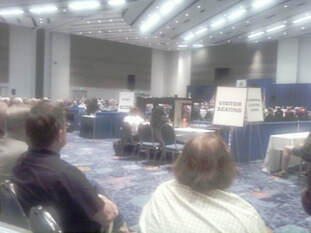We believe that along with such stories, data can help us locate these stories within a larger story, by pointing the wider church to the systemic, structural issues that continue to require change. D069 and D037 complemented resolutions C029 and D005, which called for the maintenance of statistics on the race and ethnicity of those in bishop elections as well as all who are ordained “in order to show trends in ordination, deployment, and compensation by race and ethnicity, and to report broadly by electronic and other means.” This statistical collection and reporting was further described by C029 as part of the wider church’s process of “Becoming Beloved Community,” a framework emphasized by Presiding Bishop Michael Curry.
In response to these resolutions, earlier this month an announcement came out: “The Episcopal Church invites all clergy to ‘Be a Part of the Picture’ as it seeks to Become Beloved Community.” The announcement calls for all clergy to participate in a study about the demographics, deployment, and compensation of clergy.
To participate in the study, clergy are asked to go to this page of the Church Pension Group website and fill out a special section, “Information for Church Reporting.” The section heading explains, “the data collected on race/ethnicity, gender identity and sexual orientation will only be used for analysis and reported in aggregate form and will not be published or displayed on any public facing CPG website or printed in the Episcopal Clerical Directory. Individual data will be separated from data used to administer benefits.”
Gender options in this section, which include an invitation to “check all that apply,” include “male, female, nonbinary” and then a “self-describe” write-in option, allowing for someone to write in trans specific language as best reflects their identity.
Sexual orientation options in the form are more specific and expansive than what we have yet seen acknowledged in General Convention resolutions thus far: asexual, gay, lesbian, bisexual, heterosexual, pansexual, unsure, as well as a write-in option.
The Church Pension Group has also produced a video featuring leaders from across the church, including Presiding Bishop Michael Curry, who explains the importance of participating in this study: “I have a sneaking suspicion there’s an image of who and what the Episcopal Church is that may not conform to the actual reality of who and what the Episcopal Church is today. Having data really does help to inform us in terms of who we are and also in terms of who we want to be.”
TransEpiscopal encourages all Episcopal clergy, particularly those who are trans and/or nonbinary, to participate in this study. We also appreciate all the effort that has gone in to bringing this process to fruition by so many behind the scenes. Aware as we are of trans people in the wider church who do not disclose this part of their history, we additionally appreciate the emphasis on confidentiality in this process, the promise that people’s information will not be shared without their consent. At the same time, several of us noted in updating our information that the Clerical Directory still does not have adequate public-facing, gender neutral options, whether in gender specific designations (e.g. it offers male or female only) or in titles. Particularly for those of us who are nonbinary identified and would like our entry in the Clerical Directory to reflect that truth, we ask CPG to expand the gender options for that public-facing directory. We consider such an expansion to align with resolution D090-2009 which encouraged “inclusive self-identification on all church data forms.”
We look forward to seeing the data produced by this study reflect more clearly who we already are and, as the Presiding Bishop put it, help give us more tools to assist the wider church in becoming who we want to be. Indeed, the Beloved Community God calls us to be.


 RSS Feed
RSS Feed